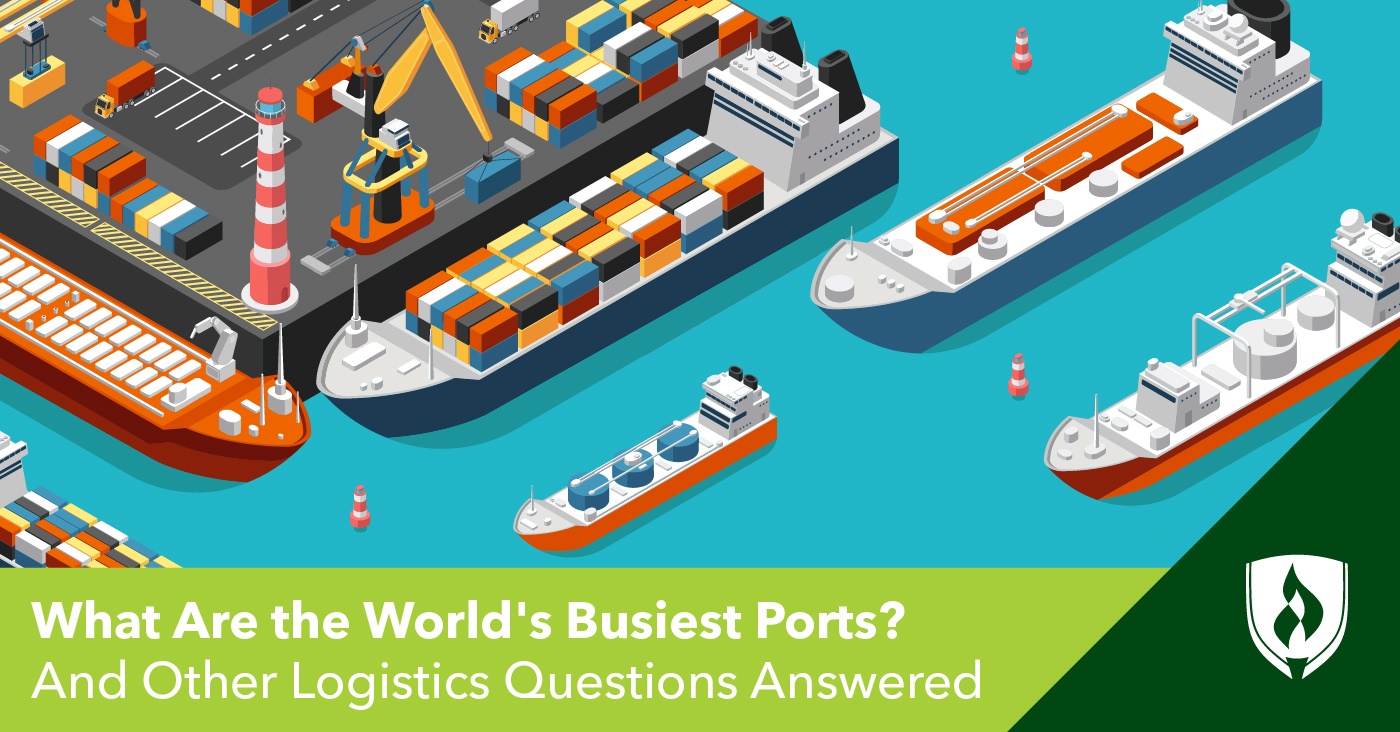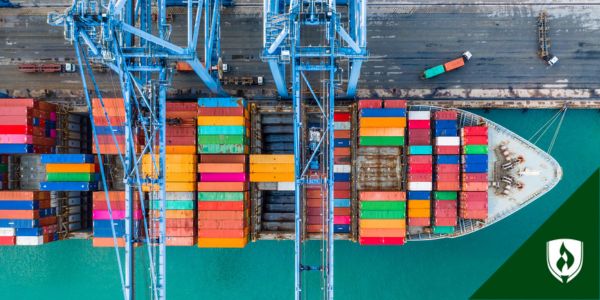
If the massive cargo-ship traffic jam caused by the Ever Given has left you curious about shipping routes and busy ports, you’re in the right place. In this article, we’ll shine a light on the world’s biggest ports and answer other logistical questions you might have about this often-overlooked element of the global economy.
What is the busiest port in the world?
According to data from the World Shipping Council, the busiest shipping port in the world is located in Shanghai, China. In 2018, this port saw just over 42 million twenty-foot equivalent units (TEU)—an inexact measurement of cargo roughly in line with a standard freight container—pass through it.1 This might not come as a surprise, given China’s massive manufacturing output. In fact, seven of the top ten busiest ports are in China.1 In comparison, during that same period, the United States’ busiest port, Los Angeles, saw 9.46 million TEU pass through.
Why do ships carry most of our goods?
In the midst of the Suez Canal blockage, you may have wondered why we rely so much on ships to move our goods instead of trains, aircraft or trucks. While all play an important role, the simple answer to that is efficiency. Oceans connect everybody in the world. Trains and trucks have land limitations, and airplanes have weight, space and fuel limitations. Another element that can be easy to overlook is the sheer size and scale of a cargo ship. The largest container ships are over 1,200 feet long and designed make optimal use of that space. It would take hundreds if not thousands of trucks or trains to carry the amount that transport ships carry.
On top of that competitive edge, the invention of the standardized shipping container revolutionized shipyard and ship capacities by streamlining and simplifying the loading process.
What is the largest transport ship in the world?
As of March 2021, the largest ship in the world is the HMM Algeciras, which can hold up to 24,000 twenty-foot containers.2 Having a hard time trying to put the size of this ship into context? To transport the same amount of goods over land, you’d have to build a line of trucks that would extend over 90 miles long.2
Is it common for ships to get stuck in the Suez Canal?
Despite the incredible volume of shipping traffic moving through the Suez every day, truly disruptive incidents like Ever Given’s blockage are still very rare. Since the canal’s opening in 1869, there have been only a handful of instances of ships getting stuck or other events that caused a lengthy shutdown of traffic.3 Most instances were tied to larger geopolitical conflicts among Egypt and other stakeholders leading to shutdowns.; though in 2004, an oil tanker, Tropic Brilliance, was lodged in the waterway for three days.3
What is the biggest danger to cargo ships?
While getting caught in a canal is a rare occurrence, that doesn’t mean that aren’t other potential headaches to be found on the high seas. There likely isn’t a clear-cut “biggest” danger out there, but factors like international conflict or instability, piracy, and even catastrophic weather events can all cause significant issues. Another substantial issue that shouldn’t be overlooked? Lost cargo. One World Shipping Council survey found that there were an average of 1,390 containers lost at sea from 2014 through 2016.4
Who coordinates all that shipping cargo?
With so many ships, trucks, trains and other methods of transport seemingly buzzing around our busy global ports, you might be wondering who’s responsible for ensuring all the good and products they’re carrying are getting to where they need to be.
This is where the forward-thinking masters of efficiency in the logistics and supply chain industry come in. Every step of the way, from raw material sources to the moment a product arrives at its destination, is plotted and planned around. An unexpected blockage or disruption can send ripples throughout the entire supply chain—and logistics professionals play a key role in navigating those changes.
Getting a closer look at the supply chain
If you find yourself curious about shipping and logistics, wait until you get a glimpse of all the many eventualities logisticians need to consider. Logistics can be a truly fascinating career for those who enjoy “solving the puzzle” of global supply chain needs. Check out our article “7 Things You Need to Know About a Career in Logistics” to learn more about the hands behind this gigantic industry.
1 “Top 50 World Container Ports” World Shipping Council. July 2019 [accessed May 2021] https://www.worldshipping.org/about-the-industry/global-trade/top-50-world-container-ports
2Marine Insight News Network, “Top Ten World’s Largest Container Ships in 2021” March 5, 2021 [accessed May 2021] https://www.marineinsight.com/know-more/top-10-worlds-largest-container-ships-in-2019/
3Yelena Dzhanova, “The Suez Canal has a contentious history and has been blocked and closed several times since opening” Business Insider March 28, 2021 [accessed May 2021] https://www.businessinsider.com/the-suez-canal-blocked-and-closed-several-times-since-opening-2021-3
4“Containers Lost at Sea – 2017 Update” World Shipping Council. July 10, 2017 [accessed May 2021] https://www.worldshipping.org/industry-issues/safety/Containers_Lost_at_Sea_-_2017_Update_FINAL_July_10.pdf





